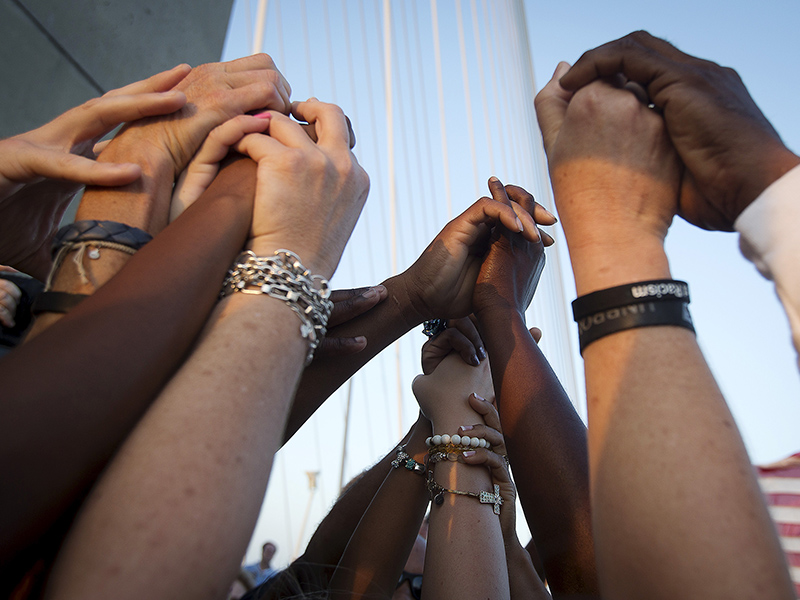One year ago, nine people were killed in a Bible Study at Emanuel AME Zion Church in Charleston, SC. The citizens of the city and the members of the congregation are still coming to terms with the tragedy.
Nadine Collier, reports the Washington Post, still struggles with the forgiveness she offered to the shooter at his arraignment:
Nadine Collier became famous a year ago for three words she said to Dylann Roof, the young white man who a few days earlier had gunned down her mother and eight other African-Americans during a Bible study at their Charleston church: “I forgive you.”
With those words about the June 17, 2015 killings, Collier set off a global debate about forgiveness.
A year later, her grief is heavy. Collier misses the sound of her mother’s voice, the smile on her face she greeted worshipers as an usher at Emanuel AME Church, the spring in her step when she led the procession for Communion.
Collier said that she learned in the bond hearing that forgiveness isn’t weak. It’s not resignation or a duty done begrudgingly. And it is not easy.
The 48-year-old Collier is trying to move on, but progress is slow. Especially with the legal delays. Roof’s trial was supposed to begin in July, not long after the anniversary of the massacre at “Mother Emanuel.” It has been delayed now till at least January 2017.
But her initial words, two days after the horror, hang powerfully in the public conscience and conversation.
“I forgive you,” she told him. “You took something very precious away from me. I will never get to talk to her ever again. I will never be able to hold her again, but I forgive you, and have mercy on your soul. … You hurt me. You hurt a lot of people. If God forgives you, I forgive you.”
The New York Times interviewed members of the congregation including Daniel Simmons, Jr., son of of the Rev. Daniel L. Simmons, who was killed in the shootings.
Mr. Schwirtz: Is there any wisdom or insight you have gained over the last year and what challenges are you still trying to overcome?
Daniel Simmons: Over the past year, there are a lot of things that transpired positive and negative for all of us. One of the things that happens out of tragedy — as people we have a choice of whether we’re going to be active or how we’re going to respond. So one of the great things, and I’m so proud of my daughter, is that we began a nonprofit, the Hate Won’t Winmovement. It’s a nonprofit that’s going to provide opportunity, services programs, initiatives about hate-related crimes, violent crimes, gun control and empowerment initiatives.
Everybody is doing something, whether it’s going back to school with their children, providing scholarships, whether it’s changing their lifestyles to have an opportunity to give back, to speak in different places, to travel to talk about their personal experiences, to sit down and do an interview with The New York Times. God chose the right place, the right families and the right individuals and most importantly the time. God does what he hates to accomplish what he loves.
RNS looks at how life has–and has not–changed since the shootings:
In the wake of the shooting at Emanuel, congregations in the AME and other black churches have ratcheted up security — installing cameras and, in some cases, posting armed ushers. Officers sometimes sit in on Bible study, and law enforcement ran a background check on Campbell Chapel’s unfamiliar visitor.
And much has changed in Charleston and South Carolina.
Blacks and whites cried together in the streets. The Confederate flag came down — for good — from its pole on the Statehouse grounds. White families joined Emanuel AME. The church was nominated for a Nobel Peace Prize. The city chiseled the names of the dead on libraries and schools. Artists honored them in portraits and murals. And the president of the United States, the nation’s first African-American president, came to Charleston and spoke about racism with a conviction that many had not heard before, and then led the congregation in an arresting rendition of “Amazing Grace.”
“For many people who really did not understand that a deeply entrenched and vicious form of racism still existed in America, they now clearly had the evidence,” said College of Charleston history professor Bernard Powers, who co-authored a book on Charleston and the massacre.
People still come to the Wednesday night Bible Study at Mother Emanuel, still held in the same room as the shooting. At first the room was packed, but even as the numbers have dwindled, there is still a sizable following:
On a recent Wednesday evening, about 40 people came. Two-thirds black and one-third white, they sat unsegregated in folding chairs, facing Emanuel’s new pastor.
The Rev. Betty Deas Clark used her clarion voice to quiet a lighthearted, small-talking crowd to take up the serious subject of the evening: how to be a good church member. But she often employed her own humor to drive home her teaching.
“You’ve got to learn to love the hell out of other people,” she said, drawing some titters for her choice of words. “I tell people all the time, the way I use ‘hell’ in church is totally different from the way you use it at home. ’Cause you do use it. You know you use it.”
Once before the final prayer, as she spoke about the esteem with which she holds her calling as a pastor, she referred to the bloodshed that took place in the room nearly a year ago.
“I know this is probably a delicate thing to say, especially in this room, but I need to say this. If you’re not willing to die for what you believe in, you’re not ready to live. You’re not ready to live,” Clark said to a chorus of “amens.”

